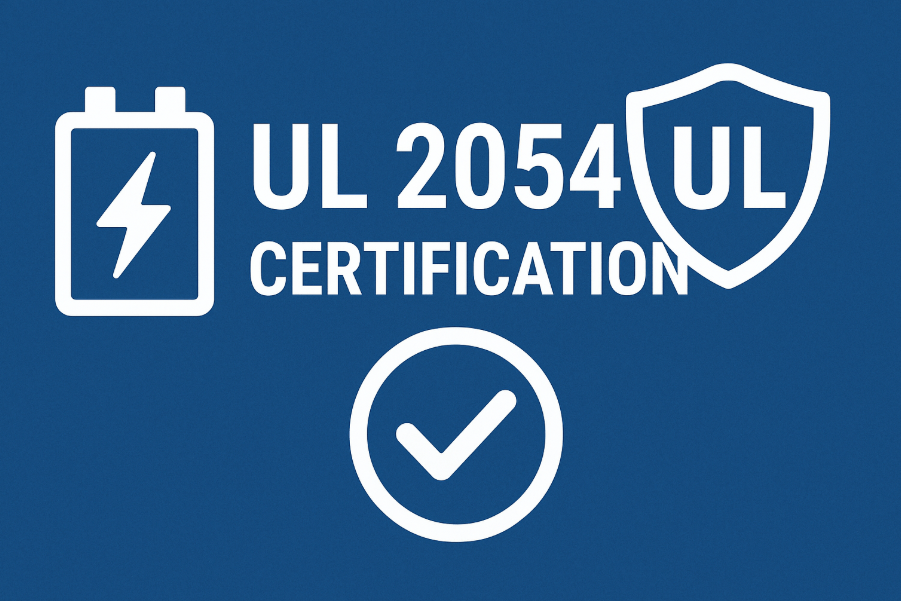🔋 UL 2054 Certification: Ensuring Safety for Household and Portable Batteries
Battery systems are powering everything from household electronics to advanced energy storage systems. But with the rapid adoption of rechargeable batteries, safety becomes a critical concern. That’s where UL 2054 certification comes into play.
UL 2054 is a globally recognized safety standard developed by Underwriters Laboratories (UL). It defines rigorous testing methods and requirements for household and commercial battery packs. Achieving compliance ensures that battery systems can operate safely under normal and foreseeable misuse conditions.
In this article, we’ll explore the scope, testing procedures, and importance of UL 2054 certification, and why manufacturers, integrators, and end-users should pay attention to it.
What is UL 2054 Certification?
UL 2054 is the Standard for Household and Commercial Batteries. It applies to battery packs rather than individual cells. This means it evaluates the pack as a complete unit, including protection circuits, connectors, and housing.

The goal is to ensure that batteries do not pose hazards such as:
- Fire risks due to overheating or short-circuiting
- Electric shock from exposed components
- Explosions caused by thermal runaway
- Leakage of hazardous materials
By testing for these risks, UL 2054 certification helps build trust in products used in homes, workplaces, and commercial systems.
Scope of UL 2054
The standard covers a wide range of battery chemistries and applications. Some examples include:
- Lithium-ion battery packs for consumer electronics
- Nickel-based rechargeable packs for power tools
- Commercial battery packs in medical devices and security systems
- Energy storage applications for residential backup
It applies to both primary (non-rechargeable) and secondary (rechargeable) batteries packaged as complete packs. However, it does not cover large industrial batteries or electric vehicle batteries, which fall under other standards like UL 1973 or UL 2580.
Key Testing Requirements in UL 2054
UL 2054 certification requires manufacturers to subject battery packs to strict evaluation procedures. Some of the critical tests include:
1. Electrical Tests
- Short-circuit test: Ensures the battery can withstand external and internal shorts without fire or explosion.
- Overcharge test: Evaluates safety when charged beyond its rated voltage.
- Abnormal charge test: Simulates improper charging to check resilience.
2. Mechanical Tests
- Impact test: Drops or crushes the battery to check for fire hazards.
- Vibration and shock tests: Simulates transportation and handling conditions.
- Mold stress test: Evaluates housing durability under heat and pressure.
3. Environmental Tests
- Temperature cycling: Exposes batteries to extreme hot and cold cycles.
- Humidity test: Ensures performance under moisture exposure.
- Altitude test: Evaluates behavior under low-pressure environments.
4. Safety and Protection Circuit Evaluation
UL 2054 also reviews the battery management system (BMS) and protective components inside the pack, including:
- Overcurrent protection
- Overtemperature protection
- Cell balancing mechanisms
Why UL 2054 Certification Matters
For manufacturers, UL 2054 certification provides:
- Market credibility with proof of safety compliance
- Regulatory acceptance in North America and beyond
- Reduced liability risks from battery failures
For consumers and businesses, it guarantees:
- Safe operation in everyday applications
- Trust in product quality
- Compliance with insurance and regulatory requirements
In industries such as medical devices, home energy storage, and consumer electronics, certification is often a prerequisite for product approval.
UL 2054 vs. Other Battery Standards
UL 2054 is sometimes confused with other UL battery standards. Here’s how it compares:
- UL 1642: Focuses on individual lithium-ion cells.
- UL 1973: Covers stationary and motive battery systems, like ESS and EVs.
- UL 9540: Applies to complete energy storage systems (BESS).
Think of UL 2054 as the bridge between cell-level and system-level safety, ensuring that battery packs are safe before they are integrated into larger applications.
The Role of UL 2054 in Energy Storage Systems
As renewable energy adoption grows, Battery Energy Storage Systems (BESS) are becoming vital. While BESS standards like UL 9540 and UL 9540A are critical, pack-level certification under UL 2054 ensures that the building blocks of these systems—the battery packs—are safe and reliable.
For companies like Sunlith Energy, integrating UL2054-compliant packs ensures that larger systems achieve not only compliance but also customer trust.
Conclusion
UL2054 certification is a cornerstone of battery safety for household and commercial packs. By addressing risks such as fire, leakage, and mechanical damage, it ensures that batteries powering our everyday lives operate reliably and securely.
As the demand for energy storage and battery-powered devices grows, compliance with UL 2054—and related standards—will remain essential for manufacturers, integrators, and consumers alike.
If you are developing or sourcing batteries for consumer electronics, medical devices, or energy storage applications, make sure they are UL 2054 certified to guarantee safety, compliance, and long-term performance.
✅ At Sunlith Energy, we provide insights into battery certifications and safe energy storage solutions. Explore our other articles on UL 1973, UL 9540, and IEC Certifications for BESS.

